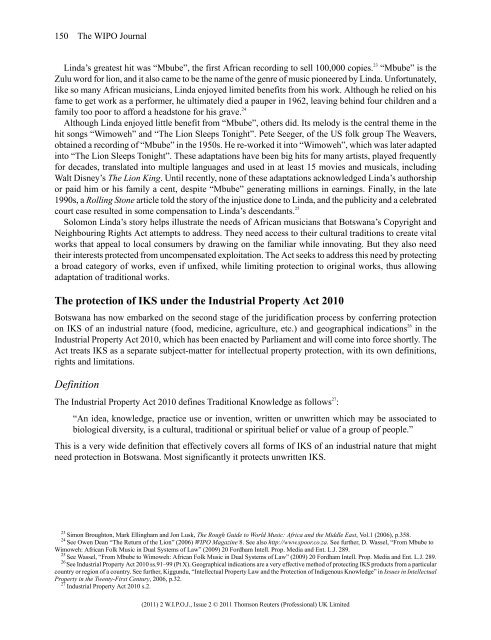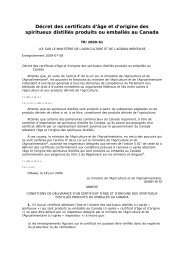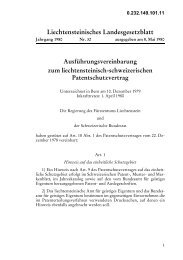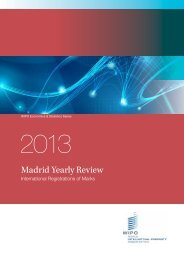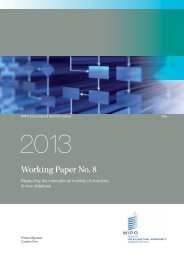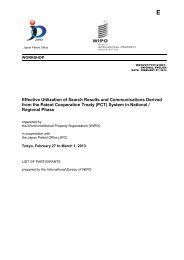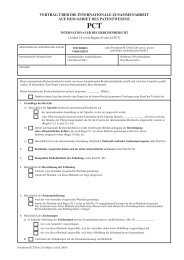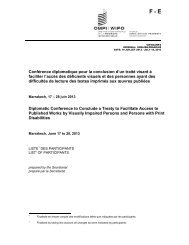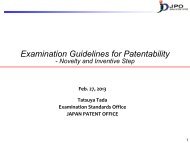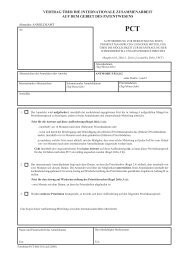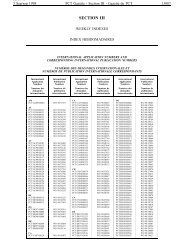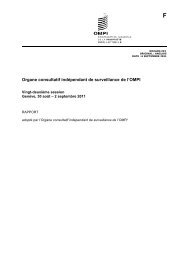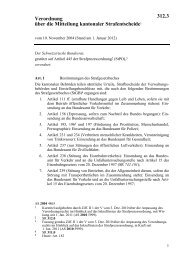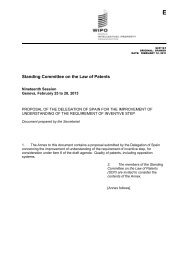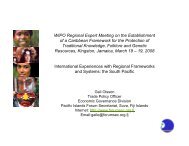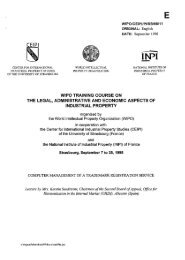WIPO Journal - World Intellectual Property Organization
WIPO Journal - World Intellectual Property Organization
WIPO Journal - World Intellectual Property Organization
You also want an ePaper? Increase the reach of your titles
YUMPU automatically turns print PDFs into web optimized ePapers that Google loves.
150 The <strong>WIPO</strong> <strong>Journal</strong><br />
Linda’s greatest hit was “Mbube”, the first African recording to sell 100,000 copies. 23 “Mbube” is the<br />
Zulu word for lion, and it also came to be the name of the genre of music pioneered by Linda. Unfortunately,<br />
like so many African musicians, Linda enjoyed limited benefits from his work. Although he relied on his<br />
fame to get work as a performer, he ultimately died a pauper in 1962, leaving behind four children and a<br />
family too poor to afford a headstone for his grave. 24<br />
Although Linda enjoyed little benefit from “Mbube”, others did. Its melody is the central theme in the<br />
hit songs “Wimoweh” and “The Lion Sleeps Tonight”. Pete Seeger, of the US folk group The Weavers,<br />
obtained a recording of “Mbube” in the 1950s. He re-worked it into “Wimoweh”, which was later adapted<br />
into “The Lion Sleeps Tonight”. These adaptations have been big hits for many artists, played frequently<br />
for decades, translated into multiple languages and used in at least 15 movies and musicals, including<br />
Walt Disney’s The Lion King. Until recently, none of these adaptations acknowledged Linda’s authorship<br />
or paid him or his family a cent, despite “Mbube” generating millions in earnings. Finally, in the late<br />
1990s, a Rolling Stone article told the story of the injustice done to Linda, and the publicity and a celebrated<br />
court case resulted in some compensation to Linda’s descendants. 25<br />
Solomon Linda’s story helps illustrate the needs of African musicians that Botswana’s Copyright and<br />
Neighbouring Rights Act attempts to address. They need access to their cultural traditions to create vital<br />
works that appeal to local consumers by drawing on the familiar while innovating. But they also need<br />
their interests protected from uncompensated exploitation. The Act seeks to address this need by protecting<br />
a broad category of works, even if unfixed, while limiting protection to original works, thus allowing<br />
adaptation of traditional works.<br />
The protection of IKS under the Industrial <strong>Property</strong> Act 2010<br />
Botswana has now embarked on the second stage of the juridification process by conferring protection<br />
on IKS of an industrial nature (food, medicine, agriculture, etc.) and geographical indications 26 in the<br />
Industrial <strong>Property</strong> Act 2010, which has been enacted by Parliament and will come into force shortly. The<br />
Act treats IKS as a separate subject-matter for intellectual property protection, with its own definitions,<br />
rights and limitations.<br />
Definition<br />
The Industrial <strong>Property</strong> Act 2010 defines Traditional Knowledge as follows 27 :<br />
“An idea, knowledge, practice use or invention, written or unwritten which may be associated to<br />
biological diversity, is a cultural, traditional or spiritual belief or value of a group of people.”<br />
This is a very wide definition that effectively covers all forms of IKS of an industrial nature that might<br />
need protection in Botswana. Most significantly it protects unwritten IKS.<br />
23 Simon Broughton, Mark Ellingham and Jon Lusk, The Rough Guide to <strong>World</strong> Music: Africa and the Middle East, Vol.1 (2006), p.358.<br />
24 See Owen Dean “The Return of the Lion” (2006) <strong>WIPO</strong> Magazine 8. See also http://www.spoor.co.za. See further, D. Wassel, “From Mbube to<br />
Wimoweh: African Folk Music in Dual Systems of Law” (2009) 20 Fordham Intell. Prop. Media and Ent. L.J. 289.<br />
25 See Wassel, “From Mbube to Wimoweh: African Folk Music in Dual Systems of Law” (2009) 20 Fordham Intell. Prop. Media and Ent. L.J. 289.<br />
26 See Industrial <strong>Property</strong> Act 2010 ss.91–99 (Pt X). Geographical indications are a very effective method of protecting IKS products from a particular<br />
country or region of a country. See further, Kiggundu, “<strong>Intellectual</strong> <strong>Property</strong> Law and the Protection of Indigenous Knowledge” in Issues in <strong>Intellectual</strong><br />
<strong>Property</strong> in the Twenty-First Century, 2006, p.32.<br />
27 Industrial <strong>Property</strong> Act 2010 s.2.<br />
(2011) 2 W.I.P.O.J., Issue 2 © 2011 Thomson Reuters (Professional) UK Limited


